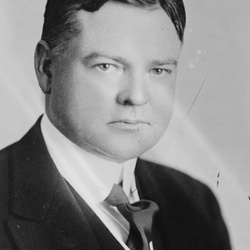WE ADVOCATE A POLICY -- NOT A METHOD OR A PLAN. WE STAND FOR A STABLE PRICE LEVEL -- NEITHER INFLATION NOR DEFLATION.
This policy will prevent alike the evils arising from inflation and those arising from deflation, and is the fundamental prerequisite for steady and orderly national progress.
INFLATION leads merchants to buy beyond their needs. Business men, finding their nominal profits large, stretch their credit beyond the danger point. Profiteering is rampant. Extravagance is widespread. Colleges, churches, hospitals, and other endowed institutions suffer through increasing expenses while their incomes remain fixed. Savings bank depositors and holders of bonds, mortgages and life insurance policies find the purchasing power of their securities melting away. The "high cost of living" burdens school teachers, judges, clerks, pensioners, salaried workers, and wage earners, and all others receiving fixed incomes. Discontent pervades many classes.
DEFLATION causes "business depression." Prices fall, with the result that merchants buy from hand to mouth. Factories shut down for lack of orders, and unemployment grows. Manufacturers cannot meet their obligations. Farmers cannot pay the mortgages on land bought at inflated prices. Thousands are thrown into bankruptcy. Economic progress is halted. Suffering and distress give rise to class hatred and political turmoil.
THE STABLE MONEY ASSOCIATION STANDS FOR STABILIZATION.
A Few Expressions
"We, the people of the United States, in order to ... establish justice ... promote the general welfare ... do ordain and establish ...
SECTION 8
The Congress shall have power:
5. To coin money, regulate the value thereof --"
Constitution of the United States.
"What we want from this economic system is greater stability, that men may be secure in their employment and their business ..."
HERBERT HOOVER, Secretary of Commerce in Review of Reviews for January, 1926.
"Next to the economic havoc of war itself, there is probably no more devastating agent at work than the rudderless and ballastless unit of value which has resulted in the price anarchy of the past generation."
DAVID J. LEWIS, U.S. Tariff Commission, in a private letter.
"It is the self-evident duty of the Federal Reserve Board to administer the Federal reserve act in such a manner as will safeguard the Nation from inflation and deflation in the future, and we heartily approve all sincere efforts being made to find and apply the best legislative method for safeguarding the purchasing power of money."
IOWA BANKERS' ASSOCIATION in Convention at Ames, 1923.
" ... Although many believe that only with rising prices can prosperity be secured, true prosperity is dependent on stability."
JAMES S. ALEXANDER, Chairman, National Bank of Commerce, New York, in annual address to Shareholders, January 8, 1924.
"The explanation is simple enough -- 'radicalism' is always found where there is suffering, injustice and failure."
New York World, March 10, 1926.
"The truth is of course that both (inflation and deflation) are bad. What is needed is stability, the point from which both alike proceed in opposite directions. When we have stability of prices we have a basis upon which trade can be carried on with confidence."
REGINALD MCKENNA, Chairman Joint City & Midland Bank at the Annual meeting, January, 1922.
"It may be that the stabilization of the purchasing power of the dollar along the lines advanced by economists will sometime help to remove some of the problems of the counterfeit wage. A solution is highly desirable ... "
EDWARD A. FILENE, in New York World, May 31, 1922.
"The primary monetary need, then, is a stable unit of value, and this does not come by chance. Even if we had no other evidence, the records of the past five years in the United States should convince us that the country is not safe-guarded against inflation by reserve ratios or merely because bank credit is expended 'in response to the legitimate demands of business,' or 'in the ordinary course of financing production.' There are at least four compelling reasons for taking measures now, to make a dependable dollar the deliberate aim of conscious policy."
W. T. FOSTER, Pres. Pollok Foundation and Waddill Catchings of Goldman, Sachs & Co., in Harvard Business Review, April, 1924.
"I firmly believe that the purchasing power of money can be stabilized. I believe that the solution, when we have it, will be found to be simple; and I trust that the solution will soon be embodied in legislation."
HON. T. ALAN GOLDSBOROUGH in the House of Representatives, May 23, 1922.











Comments